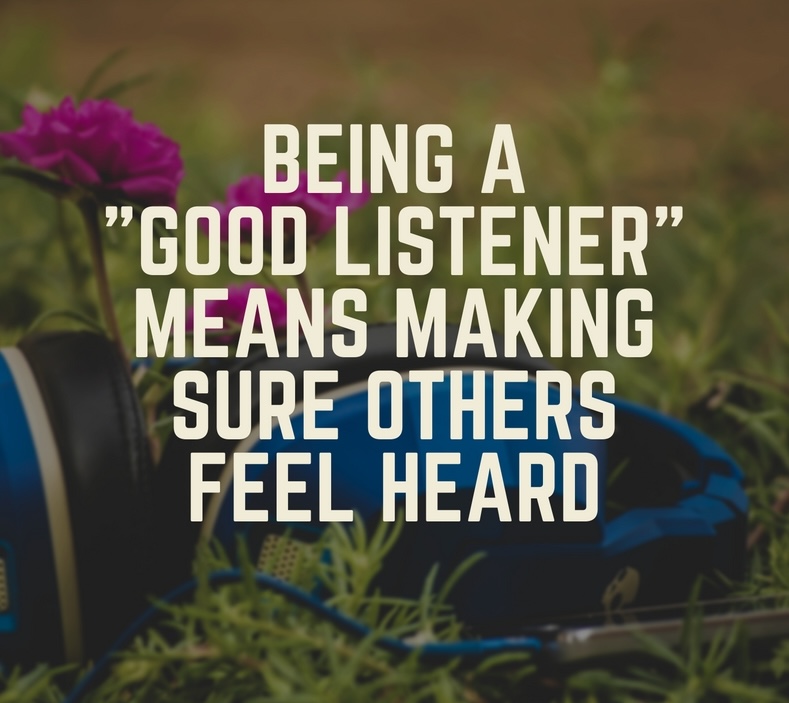Key Takeaways:
-
Different Boss, Different Lens: Soft skills like listening are tough to measure, and what one boss sees as strength, another might view as a growth area. That doesn’t mean anyone was lying—it just means expectations and perceptions vary.
-
Promotions Raise the Bar: With more responsibility comes higher expectations, especially around soft skills. Just because your listening hasn’t gotten worse doesn’t mean the bar hasn’t been raised—welcome to leadership!
-
Listening Is Not One Skill, It’s Three: Real listening involves focusing on what’s said, understanding what’s meant, and making others feel heard. If any part of that chain is weak, people might not experience you as a good listener—even if you think you are.
-
Being Told You Need to Improve Is a Gift (Sort Of): It might feel like criticism, but getting feedback is a chance to level up. Use it to hone a leadership skill that can pay off in every area of your life.
-
You Can—and Should—Ask for Clarity: Don’t be afraid to take this three-part framework to your boss and ask for more specific feedback. It shows you care, you’re engaged, and you’re ready to grow.
Dear Dana, I always get good annual reviews, until this year. This year my new boss told me I’m not a good listener. Before, my old bosses told me exactly the opposite. I got a promotion last year so this is the first time my new boss gave me a review. I’m confused. Is my new boss the problem? Was my old boss lying? – Confused in DC
Dear Confused,
I’m glad you’re focusing on your listening skills. Being a good listener is one of those capabilities that really pays off in your career and personal life. The fact that both your bosses are helping you focus on it is a good thing. That said, I totally get why you feel confused.
Of course there’s a lot I don’t know about your situation, so this advice will be a little generic, but it’s still good advice.
The first thing to remember is that listening is a “soft skill,” which means it’s very hard to measure objectively. It’s very possible your two bosses evaluate this skill differently, and that’s ok. It’s also very human of bosses to project their own weaknesses on their staff. Of course if they’re doing this to you, it’s not fair, but it does happen. Your best strategy in either case is to become a better listener than you were before, showing improvement and polishing up an important leadership skill.
You mention that you got a promotion in between these two feedback sessions. This tells me that it’s very likely that they’ve raised the bar for you on a number of your soft skills. If being successful in your new job requires better listening skills than your last job did, then even if your skills are still the same, they’re expecting more of you. This is a really common challenge we all have as we are given more responsibility. With more responsibility comes higher expectations. Many people are promoted for their technical skills and then find themselves struggling with the soft skills that more management responsibility brings. (This leadership challenge is often called the “Peter Principle,” see below.)
There are usually two reasons that they expect more of you at higher levels: (1) the competition with others for fewer senior slots gets more intense and (2) the problems get tougher—especially the kind of people problems that good listening can help fix!
One other thing that could be going on for you is that “listening” is a multi-part skill. Here are the three sub-skills involved in becoming a good listener:
- Listening: Making sure you’re focused on what the other person is saying. That can take practice in our multi-tasking world.
- Hearing: Just because you’re hearing the words they say, doesn’t mean you’re really understanding what they mean. Many people don’t put what they really mean into words. Sometimes they don’t have the communications skills, sometimes they don’t even know what they mean and other times they don’t feel comfortable saying what they’re thinking and feeling. This means you need to learn to read between the lines to “hear” what they don’t say. This isn’t mind reading, it’s the ability to empathize, take their perspective and ask really good questions.
- Making others feel heard: So if you’ve mastered the two steps above you’re probably getting the information you need, but you may or may not be making the other person feel heard, and people need to feel heard to believe you’re a good listener. When you’re trying to engage anyone (subordinates, peers and bosses), you need to be sure they feel heard. Making others feel heard happens when you communicate in ways that demonstrate you heard what they meant (step two), not just what they said. If you’re still struggling with step 2, it’s almost a guarantee that you’re struggling with step 3.
This is a high level breakdown of what being a good listener is all about. Maybe your new boss isn’t feeling heard? Maybe one of your subordinates isn’t feeling heard and is complaining to your boss? It’s hard to tell sometimes but maybe you can talk to your new boss about the three steps above and see if they have more specific advice for you.
Listen well!

Dana Theus
Executive Coach
Free Advice for Mentoring Women
Tropes and truths to help mentors and proteges navigate workplace biases and outdated advice.







